baroque (1600 - 1750)
Johann Sebastian Bach
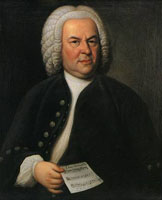 No other composer in the history of Western music quite compares to Johann Sebastian Bach. With the sole exception of opera, he mastered every existing genre of music and helped create several new ones, such as the keyboard concerto. It is no wonder that contemporaries held him in such high esteem. Soon after his death, however, he was all but forgotten, regarded only as a writer of impenetrably difficult keyboard music and some useful exercises for students. It was left to later musicians, notably Mozart and Mendelssohn, to rediscover Bach.
No other composer in the history of Western music quite compares to Johann Sebastian Bach. With the sole exception of opera, he mastered every existing genre of music and helped create several new ones, such as the keyboard concerto. It is no wonder that contemporaries held him in such high esteem. Soon after his death, however, he was all but forgotten, regarded only as a writer of impenetrably difficult keyboard music and some useful exercises for students. It was left to later musicians, notably Mozart and Mendelssohn, to rediscover Bach.
Francesca Caccini
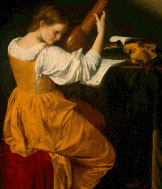 Francesca Caccini was one of the best-known female composers and performers of the Baroque era. Moreover, she is the first woman known to have written an opera. Unfortunately only one of her operas, La liberazione di Ruggiero dall’isola d’Alcina, survives.
Francesca Caccini was one of the best-known female composers and performers of the Baroque era. Moreover, she is the first woman known to have written an opera. Unfortunately only one of her operas, La liberazione di Ruggiero dall’isola d’Alcina, survives.
George Frideric Handel
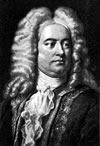 Unlike most composers of the Baroque era, George Frideric Handel has never fallen out of fashion. In the late eighteenth century, his admirers included Mozart, who arranged four of Handel’s oratorios, and Haydn, whose own oratorio The Creation pays homage to the earlier master. Nevertheless, Handel’s works in genres other than oratorio were largely forgotten. Particularly neglected were Handel’s operas, even though Handel spent much of his time and energy as an operatic composer. Since the 1950s, however, such operas as Giulio Cesare and Alcina have joined Messiah among Handel’s most beloved works.
Unlike most composers of the Baroque era, George Frideric Handel has never fallen out of fashion. In the late eighteenth century, his admirers included Mozart, who arranged four of Handel’s oratorios, and Haydn, whose own oratorio The Creation pays homage to the earlier master. Nevertheless, Handel’s works in genres other than oratorio were largely forgotten. Particularly neglected were Handel’s operas, even though Handel spent much of his time and energy as an operatic composer. Since the 1950s, however, such operas as Giulio Cesare and Alcina have joined Messiah among Handel’s most beloved works.
Johann Hasse
The music historian François-Joseph Fétis once observed that few composers were more famous than Johann Adolf Hasse – or more quickly forgotten. In the mid-eighteenth century, Hasse was the preeminent specialist in opera seria, or serious opera. In addition, he was married to one of the day’s foremost singers, Faustina Bordoni. This “power couple” ruled the opera stages of Germany and Italy for decades. As opera seria went out of fashion, however, so did Hasse’s music. Only recently has it begun to be recorded and performed again.
Giovanni Battista Pergolesi
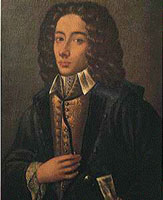 Although he lived only a short time, Giovanni Battista Pergolesi composed some of the eighteenth century’s most beloved works, among them the sacred duet Stabat Mater and the comic intermezzo La serva padrona. In fact, Pergolesi was so much admired that after his death, unscrupulous musicians saw his name as a ticket to success, forging Pergolesi’s name to hundreds of works that the composer never touched. As a result, scholars are still trying to decide what Pergolesi actually wrote.
Although he lived only a short time, Giovanni Battista Pergolesi composed some of the eighteenth century’s most beloved works, among them the sacred duet Stabat Mater and the comic intermezzo La serva padrona. In fact, Pergolesi was so much admired that after his death, unscrupulous musicians saw his name as a ticket to success, forging Pergolesi’s name to hundreds of works that the composer never touched. As a result, scholars are still trying to decide what Pergolesi actually wrote.
Henry Purcell
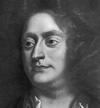 Like other English composers of the early Baroque period, Henry Purcell was not well-known outside his native country. For non-British audiences, Purcell’s main claim to fame is his Dido and Aeneas, until recently considered the first English opera (meaning a fully sung work with no dialogue). Scholars now recognize that John Blow’s Venus and Adonis deserves that title, but Purcell’s work is still one of the few seventeenth-century operas to receive regular performances. In addition, Purcell’s anthems and odes have always remained a vital part of the English choral repertoire.
Like other English composers of the early Baroque period, Henry Purcell was not well-known outside his native country. For non-British audiences, Purcell’s main claim to fame is his Dido and Aeneas, until recently considered the first English opera (meaning a fully sung work with no dialogue). Scholars now recognize that John Blow’s Venus and Adonis deserves that title, but Purcell’s work is still one of the few seventeenth-century operas to receive regular performances. In addition, Purcell’s anthems and odes have always remained a vital part of the English choral repertoire.
Jean-Philippe Rameau
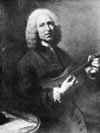 In 1722 Jean-Philippe Rameau published the Traité de l'harmonie (Treatise on Harmony), a tome that brought renown to Rameau as a leading music theorist. He also aspired to be a composer of dramatic music, and despite his peers’ initial doubts that a “theorist” could produce worthwhile operas, his numerous works went on to become well-respected and oft-performed during his lifetime. After his death, however, it was the music theory treatise that remained his most influential contribution. For the next two hundred years this document directly shaped music theory in the Western tradition.
In 1722 Jean-Philippe Rameau published the Traité de l'harmonie (Treatise on Harmony), a tome that brought renown to Rameau as a leading music theorist. He also aspired to be a composer of dramatic music, and despite his peers’ initial doubts that a “theorist” could produce worthwhile operas, his numerous works went on to become well-respected and oft-performed during his lifetime. After his death, however, it was the music theory treatise that remained his most influential contribution. For the next two hundred years this document directly shaped music theory in the Western tradition.
Luigi Rossi
One of the most respected opera and cantata composers of the seventeenth century, Luigi Rossi is best-known for his opera Orfeo, which premiered in France in 1647. This work, one of six Italian operas presented at the French court between 1645 and 1662, was part of an attempt by Cardinal Jules Mazarin, chief minister of France but a native Italian, to introduce Italian culture to France. Partly because of the unpopularity of Mazarin himself, French audiences did not take to Orfeo or to Italian opera in general. Today, however, Orfeo is one of the most popular and frequently performed operas of the early Baroque period.
Alessandro Scarlatti
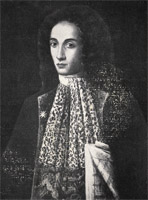 One of the best-known musicians of his day, Alessandro Scarlatti would have been all but forgotten after his death had he not fathered one of the most famous keyboard composers of the eighteenth century, Domenico Scarlatti. Nevertheless, the elder Scarlatti deserves to be appreciated for his own contributions. These include some of the most popular operas of his day, among them Gli equivoci nel sembiante (1679) and La Griselda (1721). Scarlatti’s secular cantatas also merit recognition, as they are often considered the final flowering of the genre.
One of the best-known musicians of his day, Alessandro Scarlatti would have been all but forgotten after his death had he not fathered one of the most famous keyboard composers of the eighteenth century, Domenico Scarlatti. Nevertheless, the elder Scarlatti deserves to be appreciated for his own contributions. These include some of the most popular operas of his day, among them Gli equivoci nel sembiante (1679) and La Griselda (1721). Scarlatti’s secular cantatas also merit recognition, as they are often considered the final flowering of the genre.
Domenico Scarlatti
We may owe our knowledge of Domenico Scarlatti, one of the greatest keyboard composers of the Baroque era, to a gambling problem. One story has it that Scarlatti needed help from his patroness, the Queen of Spain, to pay off his gambling debts. In return, she asked the composer to write down his improvised keyboard music. The manuscripts containing the keyboard sonatas were given first to the queen and then, when the queen died in 1758, to the great singer Farinelli. Soon thereafter, Scarlatti’s sonatas became known and loved across Europe.
Barbara Strozzi
What little is known about Barbara Strozzi (also known as Barbara Valle) suffices to make her an extremely intriguing figure. Perhaps the most outstanding female composer of the seventeenth century, Strozzi studied under respected musicians and published eight collections of her music. Music, however, was possibly not her only means of support as several sources indicate she may have been a courtesan as well.